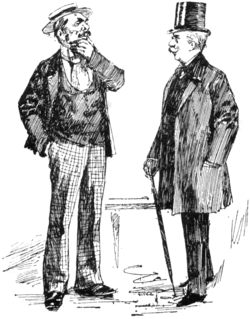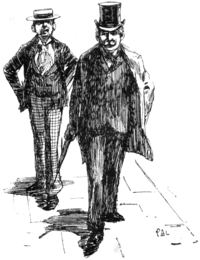The Strand Magazine/Volume 3/Issue 17/Mr. Jones
It was the housemaid announcing a visitor at a somewhat unusual hour. We were just sitting down to luncheon, I having done a pretty fair morning's work with the prospect of a long night in the House of Commons. The name of the caller was not unfamiliar, but I did not care to see him just then.
"Say I'm engaged, and ask him if he'll be good enough to write."
The maid was back again in a few minutes. Mr. Jones was not in any hurry. He would wait. As for his business, that was indefinite, only he was sure I would not know him. Piqued by the mystery that surrounded the caller, I asked what he was like. "Was he a gentleman?"
"Well, sir," answered the maid, cautiously, "he wears a straw hat."
That seemed in some degree conclusive, straw hats not being usual amongst habitués of the West-end in the height of the London season. However, if Mr. Jones had so much leisure that he could hang about a staircase whilst someone who would not know him when he saw him was eating his luncheon, that was his affair.
I had forgotten all about Mr. Jones when I opened the hall door to go forth. He was recalled to my mind by the discovery of a straw hat on a level with the landing. At first it seemed to be floating there, but at another glance I discovered a figure under it. It was evidently Mr. Jones, who was standing half a dozen steps down the staircase, reflectively gazing at the far-away basement. At the sound of the closing door he turned and looked up at me with curious inquiring gaze, which presently broadened into a smile. He said nothing, nor did I. After all, it mightn't be Mr. Jones, though there was the straw hat. If it were, I had never been introduced to him, and it is an Englishman's inalienable privilege in such circumstances, not only to keep silence, but to look with a certain amount of suspicion at the stranger.
Mr. Jones had no such scruples. "Good morning," he said, slowly mounting the steps, and fixing me with a glittering, beady eye.
"Good morning," I replied, not to be led into ambush by the friendliness of his smile.
"You're Mr. Charlecotte?" he said interrogatively, but with a certain tone of assertion.
It was no use denying the soft impeachment. I stood on my own doorstep, and, though there was no nameplate on the door, there was one in the hall. Moreover, he had obtained a kind of admission of the fact from the housemaid, which convinced him that he was at least on the right track. So I boldly answered "Yes," and, with an indifference I did not entirely feel, rang the bell for the lift.
It was some time in coming, as it usually is. Mr. Jones's conversation seemed exhausted. He advanced upwards another step, still looking me all over with a curious gaze that conveyed a sort of proprietorship in me. As he emerged from the lower steps, I had opportunity of noting a curiously square-cut, nondescript coat, a pair of check trousers, evidently new, a blue necktie, and no gloves. Mr. Jones was evidently "dressed all in his best," prepared, if opportunity offered, "to walk abroad with Sally."
I caught myself peering down the staircase. Peradventure Sally was with him. But there was no one there, and presently the lift arrived.
With it came a gleam of wild hope of deliverance. I live on the topmost range of our flats. Five flights of stairs interpose between me and mother earth. Supposing I went down in the lift and Mr. Jones walked, I should be at the hall door fully two minutes before he arrived, and could be out of sight before he reached the street. Still it would be horribly rude, the lift being there, not to offer him a share of its convenience.
"Won't you come down in the lift?" I said, though I'm afraid not succeeding in throwing much heartiness into the invitation.
"No," said Mr. Jones, still gazing at me with that mysterious look indicative of my being somebody belonging to him, "I'll just walk."
As the lift flashed downwards I caught what I believed to be a final sight of Mr. Jones, his head leaning over the banisters to get a last look at me, a gleam of amused interest in his eyes, and a friendly smile extending in a straight line across the lower part of his face.
Things happened as I had foreseen. When I reached the hall Mr. Jones was not anywhere in sight. Listening a moment, I heard footsteps pattering rapidly down the stone staircase. I made off as quickly as possible, short of a run. I was going across the Park to look in at the club for five minutes on my way to the House. There were all kinds of turnings, and Mr. Jones, presently emerging in the street, would be sure to take the wrong one. I hastened along Palace road, making for Buckingham Gate and the Mall. I did not look back, but felt certain Mr. Jones was thrown off the scent. My spirits rose with a sense of deliverance from this mysterious man with his straw hat, his wholly unwarranted proprietorial air, and his resemblance to Mr. Alexander Bell, of Dundee.
{{block center|"His name is Alexander Bell,
His home Dundee;
I do not know him quite so well
As he knows me."
I was beginning to be able to think of something else, when I heard footsteps behind. That is not an unusual phenomenon in a London street; but somehow, though I had never heard him walking before, I felt that this was Mr. Jones. I forbore to look back, and slightly increased my pace. The sound came nearer and nearer. Someone was walking at my right-hand side. I looked straight before me, but was conscious of the gleam of a straw hat in the sunshine, and felt in the small of my back the irritating influence of Mr. Jones's smile.
So we walked to the end of Palace-street, where I was to turn off to the right. In taking that direction, with Mr. Jones close at my right elbow, I must needs knock up against him if I maintained the pretence of unconsciousness of his proximity. There was no help for it but to discover him.
"Ah!" I said, looking round.
That did not amount to much, but it was really all I had to say. Mr. Jones made no articulate response, and a few more steps brought us to Buckingham Palace-road.
"I'm going this way," I said, motioning towards Buckingham Gate. So was Mr. Jones, it seemed, for he turned off to the right.
"I suppose you don't know me?" he observed, after another pause, which I felt less awkward since I had really inaugurated conversation.
"No, indeed," I said, for the first time throwing real heartiness into my voice.
"Well, it's a goodish bit since you saw me before," said Mr. Jones, his smile developing into a chuckle. "I was at Watton's, The Chronicle, at Shrewsbury, when you were there. You remember Watton's?"
Well, indeed. As Mr. Jones spoke there flashed across my vision a sight I had not beheld for twenty-five years—a quaint, quiet street in an old town; a youth walking up it, a friendless youth, setting forth to seek his fortune,
"Hoping still to meet
The luck Arabian voyagers met,
And find in Bagdad's moonlit street
Haroun al Raschid walking yet."

"A glance of mingled amazement and indignation."
In the meantime he was strolling up High-street, Shrewsbury, bent upon having a furtive look at the outside of a certain establishment before he announced himself as the Chief Reporter of "the leading county paper." He was very young—looked younger than he was—and had an impression (promptly confirmed upon his being ushered into the presence of the proprietor) that he was not exactly the kind of person to represent the dignity and importance of a leading county paper at cattle shows, bazaars, and meetings of local members. The proprietor, deluded by an enthusiastic letter of recommendation written by the editor of a Liverpool paper, had engaged him by telegraph, fearful of losing the treasure.
If ever the eyes of youth read anything rightly in the stare of mature middle age, a month's notice was delivered by the glance of mingled amazement and indignation which the proprietor of the leading county paper cast upon his new recruit. But the notice did not come in a month, or at any time, and possibly the impression was all a mistake.
"I was one of the printers at Watton's. I remember your coming to Shrewsbury. You've got on pretty well since," Mr. Jones added, looking me up and down with the same air of at least part proprietorship that had puzzled me from the first.
If he had taken my hat off in the Mall, under whose green trees we were walking, and had ruffled my hair, as Mr. Pumblechook used to ruffle Pip's when he reminded him how he had been "brought up by hand," I should not have been greatly surprised.
"I hope you've done well too," I said, trying to lead the conversation in another direction.
"Oh, yes, I've done pretty well!" said Mr. Jones, gazing, not with vain pride, but not entirely without satisfaction, on his new check trousers. "I'm having a holiday, and came to London for a day or two. I saw your likeness in Punch through a shop window this morning. Then I thought to myself, I'll go and see him—see if he's any different.'"
"And am I?" I asked.
Mr. Jones looked me up and down once more with steady gaze. He was not going to answer a question like that without preparation.
"Well," he said, after a pause, "you're older."
That was undeniable. It left me nothing to say, and Mr. Jones again lapsed into one of his intervals of silence. We walked on till we came to Marlborough House, where I turned to the right.
"Well," said Mr. Jones abruptly, "I'm glad to have seen you."
And he went up St. James's-street.
So the tide of life, swelling in London as it had slept in Shrewsbury, once more parted Mr. Jones and me.



